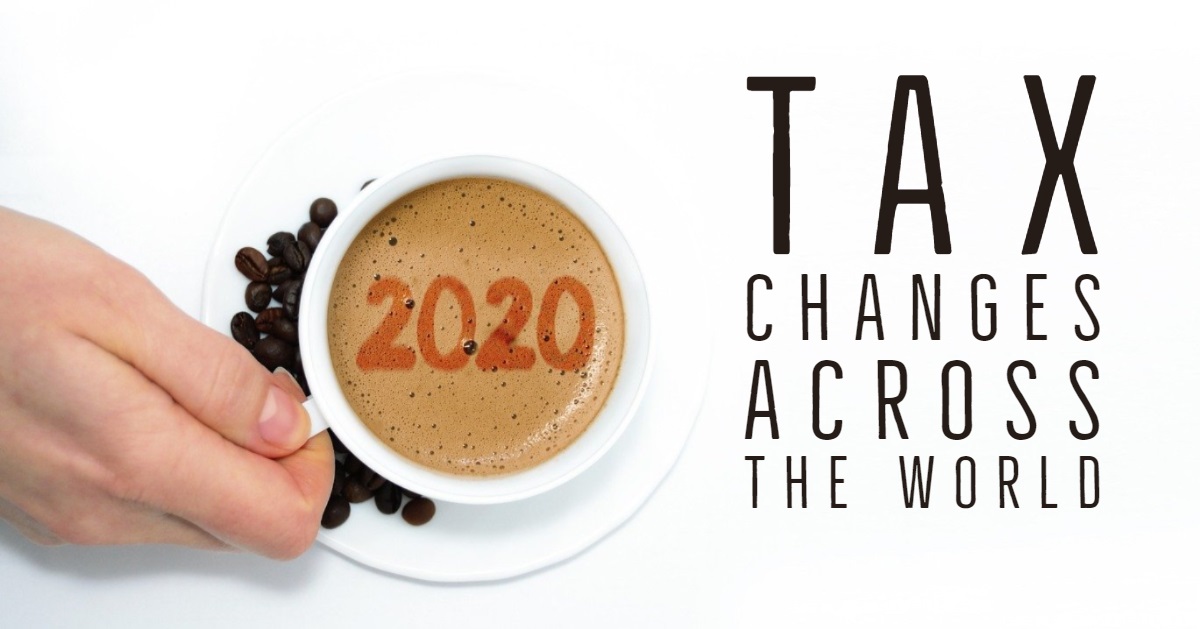Important Tax Changes Across the World


7mins
With the arrival of a new year, many business owners will already be preparing to file their 2019 federal tax returns. However, it could pay to be aware of tax changes that have just gone into effect for 2020.
Below is a summary of the main January 2020 VAT rate changes announced from around the world.
2020 VAT rate change
Albania
Implements VAT e-invoicing
Albania is to require all taxpayers to submit B2B and B2C invoices in real-time from 1 January 2020. From 2020, all invoices must be live reported to the tax authorities. All filings and supporting records must also be processed electronically.
The Albanian authorities hope to increase VAT revenues by 15% with this new e-invoice initiative. Recently, Italy stated that it had closed its VAT gap by over 10% with its new SDI e-invoice initiative this year.
Austria
Marketplace VAT liabilities
Austria is to become the latest EU country to propose making sharing economy online marketplaces responsible for the VAT of third-parties on their platforms. Austria is also considering withdrawing the €22 VAT and customs exemption for small value imports from outside the country. The EU is scheduled to scrap this relief in 2021.
Austria is proposing to increase its VAT registration threshold from €30,000 to €35,000 from January 2020. Non-resident businesses must VAT register on their first sale, and do not benefit from this threshold.
Barbados
Hotel accommodation to rise from 7.5% to 10%
The VAT rate on hotels and other accommodation services will rise to 10% from 7.5%. This will come into effect from 1 January 2020.
Bulgaria
Bulgaria is to set to zero sales its annual VAT registration threshold for non-resident businesses from 1 January 2020. Currently, foreign businesses only have to register as a VAT payer once they exceed BGN 50,000 in annual sales. Non-resident B2C sellers will still be able to use the distance selling VAT registration threshold rules.
This is in line with most EU states and follows the rules of the EU VAT Directive. From 2024, the EU will make resident VAT registrations available to non-resident small businesses.
Canary Islands
The Canary Island in its 2020 budget is to reverse the 2019 Canary Islands VAT (‘IGIC’) rise. It is now planning to increase IGIC from 6.5% to 7% on 1 January 2020.
Also, the luxury goods VAT rate would rise from 13.5% to 15%. Also, the 3% rate would be re-imposed on non-domestic electricity supplies.
Chile
The Chilean Congress is to consider a bill to levy VAT on foreign electronic and digital services sold to consumers.
The current standard VAT rate in Chile is 19%. The bill envisages a 10% rate on non-residents selling to Chilean consumers. Where a payment provider, such as a credit card company, is settling the payment, there will be a responsibility to withhold the VAT.
Mexico and Indonesia are planning similar extensions of their VAT nets to electronic services, which follows the global trend.
Croatia
Croatia is to reduce its Value Added Tax rate on the hospitality sector from 25% to 13%. This will cover café, restaurant and hotel services, excluding alcohol. Hotel accommodation is already at a 13% reduced rate in Croatia.
Croatia is also scheduled to reduce its standard VAT rate from 25% to 24% on 1 January 2020.
European Union
The EU VAT regime is due to undergo huge reforms over the next few years. Member states are debating overhauling the current ‘temporary’ systems for a definitive ‘destination’ based regime – provisionally from July 2022.
France
France is to require online marketplaces to verify the Value Added Tax status of foreign sellers using their platforms from January 2020.
The requirement to co-opt digital platforms to check the VAT registrations of third party merchants will include verifying their VAT numbers. For non-EU sellers, including from the US and China, this means appointing a local French fiscal representative. The tax authorities will also notify the marketplaces of any potential VAT fraud by sellers, and the digital marketplaces will then be expected to immediately block the merchant from their platform.
Germany
Germany is to raise its VAT registration threshold from €17,500 to €22,000 from 1 January 2020.
Once a German-resident business passes this annual level of sales, it must register and commence to submit monthly VAT returns to report any VAT due. Non-resident businesses may not take advantage of this threshold and must VAT register, if a requirement, on their first sale. The exception is B2C distance sellers who may use the distance selling VAT registration thresholds.
Hungary
The Hungarian parliament has approved a range of tax cuts for 2020, including the following VAT amendments
- The VAT on accommodation services from hotels, B&B and house-sharing will be reduced from 18% to 5%
- A range of goods stuff will be reclassified to 5%
India
The Indian Goods & Services Tax Council has proposed a revised plan for the roll-out of live e-invoice reporting from 2020. E-invoices will be initial voluntary from the start of next year, and then become mandatory for B2B and B2C transactions for large and mid-sized taxpayers by April 2020. The Council oversees the policies and management of India’s GST regime.
Indonesia
Indonesia is planning to bring non-resident e-commerce sellers into the VAT net. The legislation is being completed for foreign providers of goods and services online to the Indonesian consumer to be obliged to charge local VAT. This may be implemented sometime in 2020.
This will bring the country into line with many other Asia Pacific and European countries.
The current Indonesian VAT rate is 10%, with a registration threshold of IDR 4.8billion.
Malaysia
6% Services Tax on foreign e-services providers
The new requirement to charge service tax on e-services (and goods) comes into play on 1 January 2020. Foreign providers can start registering online after 1 October 2019. There is a registration threshold of RMB500,000 per annum. Once registered, taxpayers must submit quarterly returns by the end of the following month following the reporting quarter.
Nigeria
Standard rate rises from 5% to 7.5%
The Nigerian government has proposed raising the Value Added Tax standard rate from 5% to 7.5%.
Nigeria is considering becoming the latest country to introduce a withholding VAT regime on e-commerce. This would require payment providers, credit cards and other electronic payment schemes to hold back 5% VAT on any transaction between a Nigerian consumer and an online seller. This VAT would then be forwarded directly to the tax authorities.
Norway
Mandatory SAF-T reporting will be introduced for businesses from 1 January 2020. It is only required on an on-demand basis by the tax authorities, typically immediately before a tax audit.
Norway has also proposed a simplified VAT registration process for online sellers with imports to consumers.
Paraguay
Extends 10% VAT to e-service providers
Paraguay has enacted a tax provision to impose VAT on sales of electronic services to its consumers. This is based on the customer who is a resident of Paraguay. This may be determined by their IP address, invoice address, bank account or location of the issuer of a credit card.
Sri Lanka
Sri Lanka’s government has announced plans to reduce its Value Added Tax standard rate from 15% to 8% most goods on 1 December 2019. Financial Services will remain at 15%. Tourism-related services will be zero-rated. At the same time, it will withdraw the 2% Nation Building Tax.
The VAT registration threshold has recently been raised from 1 million rupees to 25 million per month.
The Sri Lankan VAT rate had been increased from 11% to 15% in November 2016.
Singapore
7% GST on non-resident providers of digital services
Singapore has updated its plans to levy its 7% Goods & Services Tax on B2B digital services provided by non-residents to consumers from 1 January 2020. This includes providers such as Airbnb, Amazon Prime, Netflix, Apple Music and other streaming media, gaming and app providers.
Taiwan
E-invoice for foreign digital service providers
Non-resident online sellers of digital services to Taiwanese consumers will be required to issue cloud-based government uniform invoices (GUI) from 1 January 2020. These are a form of government preapproved e-invoices.
Thailand
The Thai VAT rate is currently 7%. The VAT on non-resident sellers could raise to 4billion baht per annum. A key measure in the existing proposal include:
- A VAT registration threshold of 1.8million
- No VAT invoice is required.
- Marketplaces facilitating sales of service may become responsible for the VAT and registration
- An online registration portal is to be provided in English
- The VAT return will be in English, too
- There is no provision to reclaim any input VAT suffered
- B2B supplies may be zero-rated if the customer can provide their local VAT number
Uganda
Uganda has clarified the requirements for foreign providers of digital services to levy 18% VAT on sales to local consumers.
Non-resident providers must register with the Ugandan Revenue Authority. They are required to file monthly VAT returns by the 15 days of the following month. Any VAT due must be settled by the following deadline.
United States
Sales tax changes for foreign sellers and marketplaces
Following the 2018 South Dakota vs Wayfair ruling at the US Supreme Court, most of the 45 US states which impose sales tax have updated their rules to bring in out-of-state (non-resident or foreign) sellers into the tax net.
Uzbekistan
Imposes 15% VAT foreign e-service providers
Uzbekistan is to become the latest country to require foreign providers of electronic services to charge Uzbek VAT at 20%.
Zimbabwe
Cuts VAT from 15% to 14.5%
The Zimbabwean 2020 budget includes some proposed changes to the VAT regime:
- A reduction in the VAT rate from 15% to 14.5%
- A rise in the VAT registration threshold from ZWL60,000 to ZWL 1 million per annum
Need help with your taxes, reach out to our helpdesk team now.



















 TrustGuard - PCI Security Scanner
TrustGuard - PCI Security Scanner
